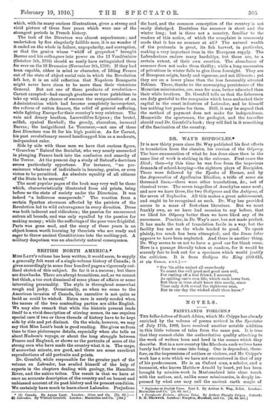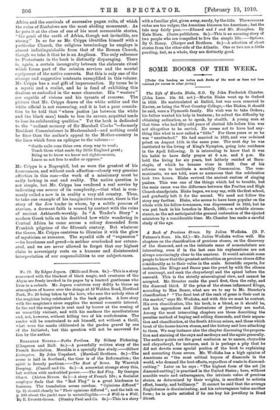NOVELS.
FAIRYLANDS FORLORN:t
TEE belles-lettres of South Africa, which Mr. Cripps has already enriched by the volume of poems noticed in the Spectator of July 17th, 1909, have received another notable addition in this little volume of tales from the same pen. It is true that they cannot claim the authoritative quality attaching to the work of writers born and bred in the scenes which they describe. But in a new country like Rhodesia such writers have barely had time to come into being. One is dependent, there- fore, on the impressions of settlers or visitors, and Mr. Cripps's work has a note which we have not encountered in that of any of his predecessors. He is an Oxford man, a scholar, and a humanist, who knows Matthew Arnold by heart, yet has been brought by mission-work in Mashonaland into close touch with the natives, and, unlike some missionaries, is deeply im- pressed by what one may call the ancient earth magic of
• Saphocks in English Farm Part L By Arthur B. Way, D.Lit. London: Macmillan and Co. [3e. 6d. net.]
t Fairylands Forlorn : African Tatra. Byy Arthur nearly Cripps. Oxford: B. S. Blackwell. London: Bimpkin, and Co. [3s. ed. net.] Africa and the survivals of successive pagan cults, of which the ruins of Zimbabwe are the most abiding monument.. As he puts it at the close of one of his most memorable stories, "the genii of the earth of Africa, though not invincible, are strong." In so far as Mr. Cripps identifies himself with a particular Church, the religious terminology he employs is almost indistinguishable from that of the Roman Church, though we take it that he is an Anglican. The only reference to Protestants in the book is distinctly disparaging. There is, again, a certain incongruity between the elaborate ritual which forms part of the mission services and the mental equipment of the native converts. But this is only one of the strange and suggestive 'contrasts exemplified in this volume. Mr. Cripps has a real gift of impersonation. By turns he is a mystic and a realist, and he is fond of exhibiting this dualism as embodied in the same character. His " wasters " are capable of visions and his tyrants of remorse. The picture that Mr. Cripps draws of the white settler and the white official is not reassuring, and it is but a poor consola- tion to be told that "where justice Las between the white and the black man] tends to lose its savour, acquittal tends to lose its exhilarating qualities." Yet the book is dedicated to the " radiant memory of Sir Marshall Clarke "—formerly Resident Commissioner in Mashonaland—and nothing could be finer than the author's appeal to the Mother-country in the lines which form an epilogue to the volume :— " Guide exile sons thine own steep way to weal ; Teach them what made thy little England great ; Bring us to know we know not righteousness, Leave us not free to suffer or oppress."
Mr. Cripps is a Negrophil, but so were the greatest of his forerunners, and without such affection—clearly very genuine affection in this case—the work of a missionary must be sadly lacking in zest and reality. The native question is not simple, but Mr. Cripps has rendered a real service by indicating one source of its complexity,—that what is com- monly called a new is in reality a very old country. Thus, to take one example of his imaginative treatment, there is the story of the Jew trader in whom, by a subtle process of atavism, a dormant faith is roused by contact with the ruins of ancient Ashtaroth-worship. In "A Trader's Story" a modern Greek tells on his deathbed how while wandering in Central Africa he came across a colony descended from Frankish pilgrims of the fifteenth century. But whatever the theme, Mr. Cripps contrives to illumine it with the glow of mysticism or romance. The squalid side of "expansion" —its harshness and greed—is neither overlooked nor extenu- ated, and we are never allowed to forget that our highest claim to sovereignty rests on a humane and disinterested interpretation of our responsibilities to our subject-races.









































 Previous page
Previous page